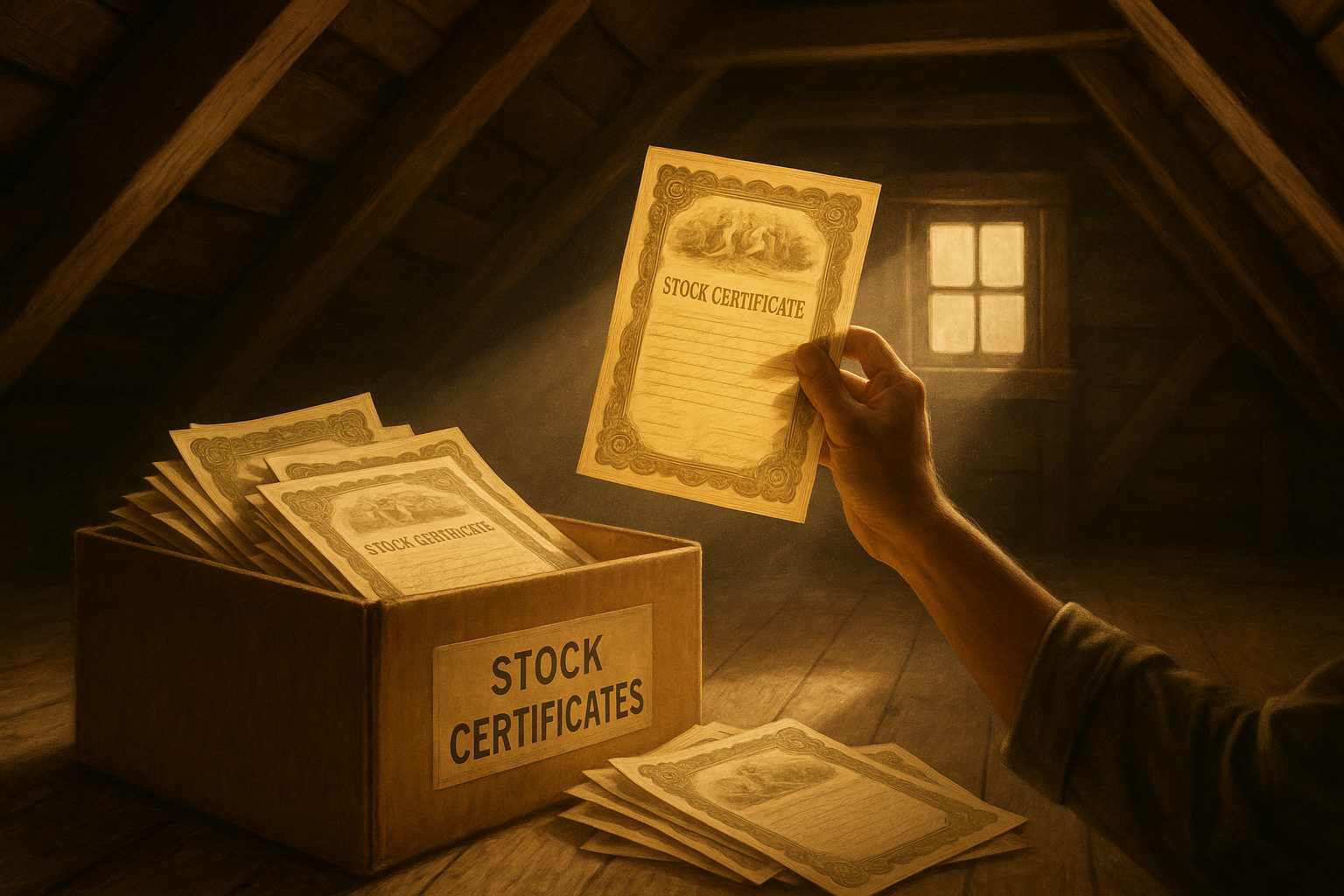So you've discovered some dusty old stock certificates while cleaning out the attic or sorting through an estate. Welcome to one of capitalism's more archaic treasure hunts! Nothing quite compares to that moment of finding yellowed paper that might be worth nothing or might be your ticket to a surprise windfall. It's financial archaeology at its finest.
Let me tell you, these paper certificate situations are more common than you'd think. In my years on Wall Street, I've fielded countless calls from friends who suddenly found themselves amateur corporate detectives, trying to determine if Great-Uncle Harold's investment in some long-forgotten company might actually pay for a vacation home.
The Lost Stock Certificate Conundrum
Your M&C Systems, Inc. certificate represents a peculiar financial limbo that exists in our increasingly digital world. We've mostly moved beyond paper certificates, with most securities now existing as electronic entries in a brokerage's database. But these paper remnants of capitalism past continue to float around in filing cabinets and safety deposit boxes across America.
The fundamental problem here is one of information asymmetry. You have a piece of paper claiming ownership in a private entity, but no market mechanism to price it or transfer it. It's like having a key but not knowing which door it unlocks—or if the door even exists anymore.
Private companies exist in a different universe than their publicly traded counterparts. There's no ticker symbol to look up, no SEC filings to comb through, no Bloomberg terminal that will instantly tell you what your shares are worth. Instead, you're left with what I call the "private company information void"—a black hole where transparency goes to die.
Your Detective Toolkit
Given your situation with M&C Systems, here's the approach I'd recommend, based on having helped navigate similar situations:
First, that CUSIP number you mentioned is actually quite valuable. The Committee on Uniform Securities Identification Procedures assigns these nine-character alphanumeric identifiers to all registered securities. While it won't tell you the value, it confirms the authenticity of your certificate and provides a starting point.
Since you mentioned the company might still exist, your next step is corporate registry searches. Every state maintains records of incorporated entities. New Jersey's business registration portal (https://www.njportal.com/DOR/BusinessNameSearch/) would be your first stop. This should give you the company's registered agent—often a law firm—who is legally required to accept communications for the company.
If that doesn't work, try the old-school approach: business directories, industry associations, even LinkedIn. Small private companies often maintain low profiles online, but their executives don't always do the same.
The Private Company Valuation Puzzle
Let's assume you track down the company. Now comes the interesting part: determining if your paper is actually worth anything.
Private company valuations exist in a fascinating theoretical space where precision is impossible. Without market-based price discovery, you're left with imperfect proxies and educated guesses. The company itself might have a shareholder agreement with specific provisions for valuing shares, or they might use periodic internal valuations for employee stock options or tax purposes.
What you're likely to discover falls into one of four scenarios:
- The company was acquired, in which case your shares may have been subject to a mandatory buyout
- The company still exists as a going concern, in which case your shares represent actual ownership
- The company failed and was formally dissolved, making your certificate a collectible at best
- The company exists on paper but is effectively dormant, creating a limbo scenario
The most interesting scenario is #2, which raises all sorts of governance questions. As a shareholder, you technically have rights—access to financial statements, votes at shareholder meetings, maybe even dividends if they've been declaring them. Companies sometimes "forget" about small shareholders, especially from stock issued decades ago.
Beyond The Search
While you're pursuing this particular certificate mystery, it's worth considering a broader audit of any estate you're managing. Paper stock certificates were common practice until the 1970s, and even beyond for smaller companies or certain types of shares. They tend to cluster—people who invested in one private company often invested in others.
Also, don't dismiss the certificate's potential collectible value. Some old stock certificates, particularly those with interesting artwork or from famous failed companies (Enron, anyone?), can be worth more to collectors than they ever were as actual securities.
The financial markets have a way of creating these little time capsules—paper promises from decades past that somehow survived while the companies, markets, and even the financial systems that created them have transformed beyond recognition. There's something almost poetic about it, if you can get past the frustration of trying to figure out if your paper is trash or treasure.
Good luck with your search. Sometimes these hunts end with a surprising windfall. More often, they end with an interesting story and a decorative piece of financial history for your wall. Either way, you've gotten a tiny glimpse into the messy, paper-strewn history of American capitalism.
